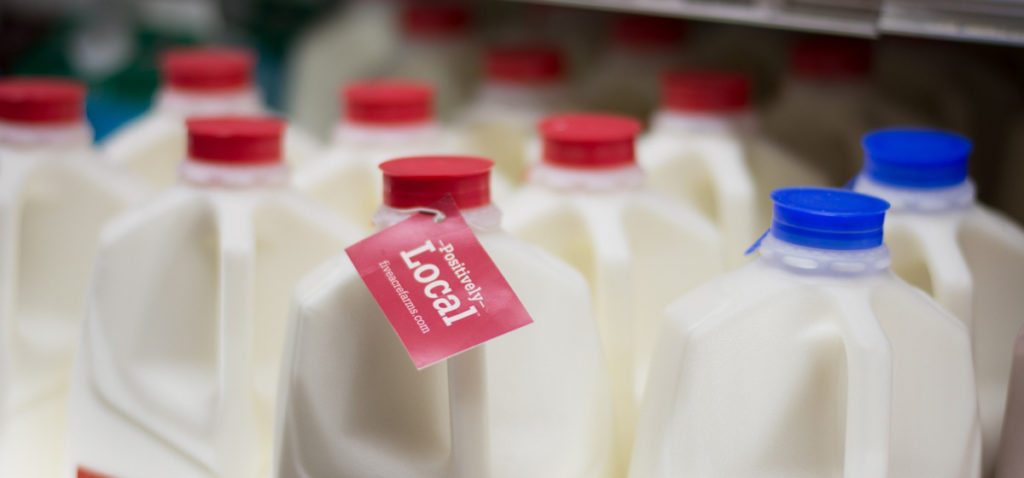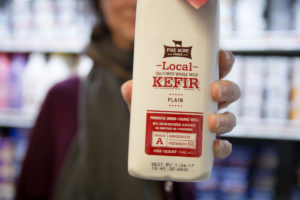A Fresh Approach to Farm-Fresh Shopping

The best ideas only get better with time. Take Five Acre Farms, a seven-year-old business putting an innovative spin on buying local that founder and CEO Dan Horan first hatched more than 25 years ago.
Back in 1990, when Dan was fresh out of college, he started the organic vegetable farm Waldingfield Farm. He quickly realized that farming has more to do with business and marketing that straight up growing. So he went to business school, writing in his application essay about the unrealized possibilities of regional agriculture.
Fast forward to 2010, when Horan—who went on to serve as a general manager at Gourmet Garage and then CEO of New York hot-dog icon Papaya King—found himself ready to bring to life the regional agriculture idea that sparked his interest so long ago. He even still had a name for it: Five Acre Farms. (And yes, he still has Waldingfield, too: His younger brothers run it now.)
Five Acre Farms takes the “buy local” ethos beyond the farmers’ market, meeting customers where they already are—the grocery store— with farm fresh, sustainably produced food.
That’s because Five Acre Farms, currently focused on the Northeast, buys directly from the farmers themselves sourcing from within a 275-mile radius of where its products are sold. What’s more, its egg, dairy, and apple products can be traced back to the farms that produced them with packaging that introduces shoppers to the growers and producers right on the label.
It’s grocery store simplicity with farmers market accountability: a supermarket-friendly brand that puts farmers first.
“Farmers don’t have to be heroes on a pedestal or people we don’t know,” Horan said. “It’s about making food and the people involved in making it very accessible. That’s one of the first things we set out to do.”
Horan realizes that convenience still drives a lot of our shopping, which makes having a recognizable brand a key objective. The genius of Five Acre Farms is in creating a conscientious brand that farmers are as happy to sell to as customers are to buy from.
Five Acre Farms pays farmers fairly, and directly, offering above-market rates that respect the cost of maintaining such lofty ideals. This means keeping farmers farming.
“I genuinely believe that if we don’t pay farmers properly, we’re not going to have them,” Horan said. “Recognizing that there’s more than one stakeholder is key to making a significant social impact.
In return, farms “have to produce really good stuff and be open and transparent,” Horan said. And really good doesn’t mean really expensive: Horan is committed to an everyday kind of “local,” placing products in community grocery stores and pursuing a “middle-pricing” strategy that lands between conventional and organic.
The result is multiple wins: better access to local food, shoppers connected to area farmers, environmental sustainability and farmland preservation, and stronger rural farm economies.
Even as Five Acre Farms is rethinking local in grocery stores, though, it’s also going beyond them, supplying to restaurants, coffee shops, and food service companies. In the Northeast, its fully traceable products from 25 farmers and producers now appear in 150 retailers and 75 restaurants and coffee shops in New York, New Jersey, and Connecticut, as well as on more than 50 Delta Airline flights. Five Acre Farms milk is also the official milk of Kellogg’s NYC cereal café in Times Square. 
“We’re a turnkey solution to a supermarket or distributor who wants to get into local but maybe offers only one or two local items or has just a seasonal arrangement. We tie up all the loose ends and make sure the logistics are iron clad, so it’s easy for someone like Chef’s Warehouse to onboard local in a comprehensive way,” Horan said. “We’re going to be doing that more and more.”
This progressive, socially conscious thinking—and the huge impact it stands to have on our food economy—is what made Fair Food Network so excited to invest in Five Acre Farms, committing $350,000 in equity financing. Not only does Fair Food Network own a small percentage of the company, but Fair Food Network president and CEO Oran Hesterman is now also a Five Acre Farms board member and the chair of the board’s agricultural policy committee.
“Good food—local, healthy food—has the power to change not just our food system but our entire economy,” Hesterman said. “Five Acre Farms is imagining brand new ways to do that, and benefiting shoppers and producers in the process.”
The relationship was a no-brainer. “It became clear pretty quickly how close what we’re trying to accomplish is,” Horan said—he even saw Hesterman give a presentation in which one slide was an “almost perfect overlay” of Five Acre Farms’ strategic goals.
Next, Horan plans to increase Five Acre Farms’ network, sales, and distribution in the Northeast, where the company has achieved 64% annualized growth in sales since 2010. He has his eyes on the rest of the country, too: Horan has long-term plans to develop new products and expand nationwide, selling whatever “local” means to a given region.
“Good food—local, healthy food—has the power to change not just our food system but our entire economy,” Hesterman said. “Five Acre Farms is imagining brand new ways to do that, and benefiting shoppers and producers in the process.”
Courtney Balestier is a James Beard-nominated writer based in Detroit.







